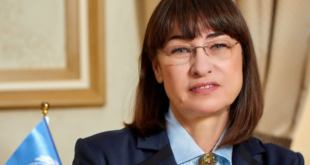Barcelona – Times of Egypt
The Union for Mediterranean (UfM) convened on 16 June to discuss the impact of the novel coronavirus (COVID-19) on the water sector, the long-standing challenges in the region, access to water supply and sanitation services for their populations.
The meeting brought together over 100 participants from 21 countries and represented more than 30 regional expert organisations. Minister for Energy and Water Management of Malta, Michael Farrugia, the First Undersecretary at the Ministry of Water Resources and Irrigation of Egypt, Ragab Abdel Azim, and the Secretary General of the Union for the Mediterranean, Nasser Kamel were present at the meeting.
“This pandemic provides us with an opportunity to build better actions with tangible results for our citizens and our environment. Through the implementation of the UfM Water Agenda we aim to ensure a sustainable water supply not only for domestic water use but also for energy production, irrigation and environmental protection”, said the Nasser Kamel, the Secretary General of the UfM.
Participants stressed that their countries faced significant adaptation challenges with the pandemic, that were better addressed when tackled cooperatively.
“Priorities of the regional water agenda have changed due to COVID-19, but the main strategies and projects remain. Revisiting them would probably be needed to better respond to this newfound situation”, said Ali Subah, secretary General, Ministry of water and Irrigation of Jordan.

It is worth mentioning that the Mediterranean know-how on water reuse lead to global scientific detection and management of the virus in wastewater.
The meeting emphasised the importance of maintaining the focus on meeting the Sustainable Development Goals (SDGs). Discussions led to the agreement of regional priority actions in the framework of the UfM Water Agenda, that will complement individual country efforts, supported by and eventually aligning with the European Green Deal, as a roadmap for a sustainable and resilient recovery.
“We should become bolder and more decisive on our collective efforts to achieve the SDGs and face the challenges with vision and wisdom. Water security is at the core of SDGs of COVID preparedness”, affirmed Monika Weber-Fahr, Executive Secretary and CEO, Global Water Partnership (GWB).
Daniel Calleja, the Director General of Environment, European Commission said “the EU commission is working towards recovery, which has to be achieved in a sustainable way. We need to act together, and we need to act now”.
It was stressed that water governance is key and requires more financing from the public sector, private sector and the help of development agencies. Thus, a series of training sessions will be held to assist water ministries in addressing international climate financiers to implement transformative climate resilient water projects. They agreed to draft a financial strategy to explore potential reductions in costs from technological and organisational innovations in the sector.
Alain Mayssonnier, President of the Institut Méditerranéen de l’Eau, stressed “UfM and IME have to play the role of Exchange Platform to promote the new dimension of the ‘five fingers alliance’, water, energy, health, food and education, which analyses the impact of COVID-19 on the water agenda, and supports the implementation of the strategy by providing a platform for policy dialogue and by labelling exemplary projects”.
“The meeting showcased the commitment of governments, organisations and experts to a regional approach in order to tackle the challenges through regional coordinated responses and initiatives, with the support from donors and development partners”, said Almotaz Abadi, UfM Water Managing Director.






